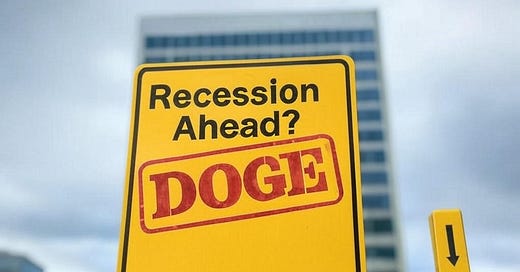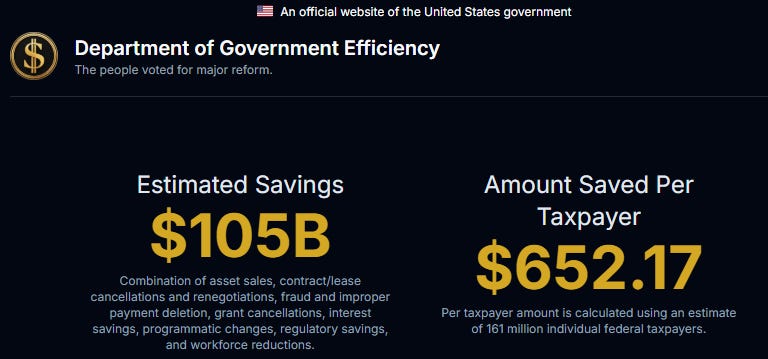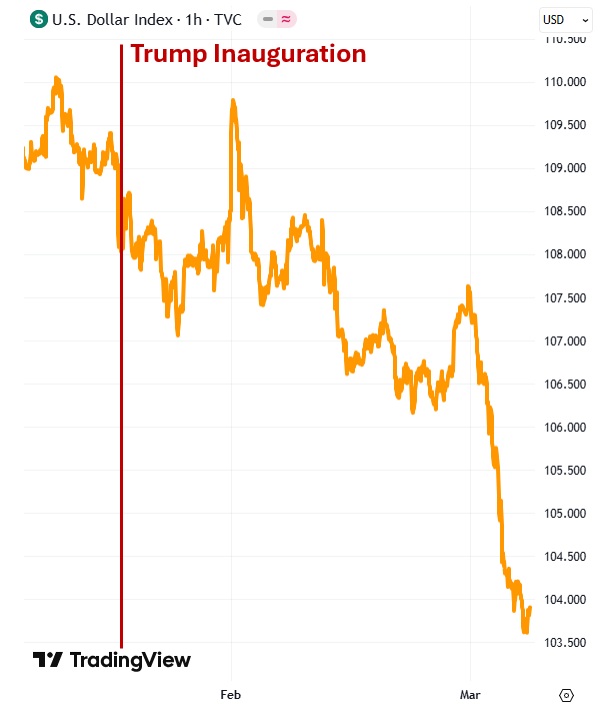To paraphrase Solzhenitsyn, we know that they are stealing. They know that they are stealing. They even know that we know they are stealing. But they are still stealing.
David Sacks, White House Crypto Czar
More than six years ago, I moved to a community of 100+ townhouses in Northern Virginia. For 3 years, I served on the management committee of this community, where I could observe a fascinating microcosm of politics with factions, rivalries, and alliances that would have made a great inspiration for the House of Cards writers.
My main legacy was the renovation of the community's gym, which I delivered on time and under budget—earning me the coveted title of Volunteer of the Year in 2022. But more interestingly, I got to witness the political campaigns for the board of the community.
Unlike any political campaign you might have followed in the public domain, this one was very different because all the candidates ran on the same platform: spending less. Unlike at the government level, residents understand that if the board approves lavish spending, they will pay for it through higher monthly dues.
This created a very interesting dynamic that was completely opposite to what we see in the public sphere because—and this is key—the community cannot print its own currency, and the community cannot borrow. But what people may want at the level of a townhouse community may be very different from what they expect from the federal government…
The Department of Government Efficiency
This leads me to the efforts currently being undertaken by the Department of Government Efficiency, or DOGE, headed by Elon Musk, which is ruthlessly going after wasteful federal spending.
The government waste being uncovered by DOGE is so extensive and absurd it could fill a dozen newsletters. From absurd contracts to ghost buildings collecting dust, thousands of software licenses nobody's clicked on since the Obama administration, and Social Security checks being cashed by people who would have to be older than the lightbulb—it's a tragicomedy of fiscal errors that would be hilarious if taxpayers weren't all paying for the punchline.
I'm not here to discuss whether these cuts are justified or not, nor the methods used by DOGE, although the scale of the backlash is most likely commensurate with the scale of the fraud and wasteful spending being uncovered.
If you are interested in digging through the canceled contracts or viewing cool dashboards on the expenditures of the US Federal Government, you can go to the doge.gov website.
Warning Signs
However, in recent days, multiple indicators have started flashing red on the state of the US economy, and DOGE may have something to do with this.
The Atlanta GDPNow indicator, which has a solid track record of predicting GDP growth, has been falling off a cliff and is now predicting a severe contraction in the first quarter of 2025. It is a real-time GDP forecast produced by the Federal Reserve Bank of Atlanta that attempts to predict the current quarter's GDP growth using available economic data. Unlike official GDP estimates that come with a lag, GDPNow provides an immediate reading on economic conditions, which is why economists pay close attention when it shifts dramatically.
Even unproductive, wasteful spending generates GDP when financed with additional debt and fiscal deficit. So, cutting wasteful spending is likely to result in a contraction of the GDP in the short term. But of course, if it's wasteful spending or fraud, then that money isn't contributing productively to the economy and could be deployed elsewhere to create actual value. It may be short-term pain for longer-term gains, but it’s still short-term pain.
What if the relatively high GDP growth enjoyed by the US since 2022 had only been the result of high fiscal deficits? Perhaps what the US has been celebrating as economic strength was merely the sugar high of borrowed prosperity—a national-scale version of maxing out credit cards and mistaking debt for wealth.
Every dollar DOGE cuts is a dollar that doesn't flow to a government contractor, doesn't pay a federal employee, and doesn't circulate through the economy. In the short term, this creates an economic vacuum that the market is struggling to digest.
A Lot of Debt to Roll Over
There is another reason why the Trump administration may not object to short-term pain and some recession fears. The US Treasury has to roll over $7 trillion of short-term debt in 2025, a legacy of the previous administration, which decided to borrow short-term to keep interest expenses low when spending like there was no tomorrow, running a fiscal deficit of nearly $2 trillion per year.
This debt rollover is essentially like refinancing a massive short-term loan. When the government borrows short-term, it gets lower interest rates but takes on the risk of having to roll over that debt at potentially higher rates in the future. Think of it as choosing an adjustable-rate mortgage instead of a fixed one—great when rates are falling, not so much when they're rising. This is the gamble made by the previous Treasury Secretary, Janet Yellen.
A few months ago, the now-US Treasury Secretary Scott Bessent said he wanted three things: a lower US dollar, a lower 10-year yield, and a lower oil price. These three objectives work together: a weaker dollar boosts exports, lower yields reduce government borrowing costs (crucial for that $7 trillion debt rollover), and lower oil prices act as a tax cut for consumers.
Let’s see how he has been doing since January 20, when President Trump was inaugurated.
The collateral damage from DOGE's budget axe is showing up in the stock market, with the Nasdaq now in correction territory. But Trump 2.0 is playing a different game than Trump 1.0. During his first presidency, Trump treated the stock market as his personal report card, tweeting about every record high. Now, he and Treasury Secretary Bessent are laser-focused on US government bond yields.
Since recession fears usually drive yields lower (as investors flee to the safety of government bonds, pushing their prices up and yields down), Trump and Bessent probably don’t mind that the market is worried, and if DOGE is successful, it will cut government spending and deficit, which means that it will likely also cut inflation, which is good news for the holders of US Treasuries. The stock market will have to wait.
The Gold Rush
Another factor impacting the GDP calculation is the unprecedented gold flowing back to the US. It might seem counterintuitive that importing valuable gold hurts GDP calculations, but here's how it works: GDP measures domestic production, and imports are subtracted because they represent production that happened elsewhere.
The precious metal that central banks spent decades telling us was a 'barbarous relic' is suddenly being hoarded like toilet paper during a pandemic. Funny how that works. There are multiple reasons why this is happening, but none fully explain the magnitude of the gold shipments to the US.
While no one can convincingly explain why so much gold is being shipped to the US, what is undeniable is that the gold price has been going through the roof and has been reaching all-time high after all-time high. Readers of this newsletter will not be surprised as I have talked multiple times about the role of gold in a portfolio.
The Washington DC Area Recession
One area that will suffer from DOGE and the cut in federal spending is the Washington, D.C. area. Thousands of workers are being fired, furloughed, or losing contracts with the federal government.
Some of the early signs of this recession in the area are the rise in unemployment claims and the increase in houses and condos for sale in the market.
Plot Twist
On March 7th, the Atlanta Fed, which is responsible for the GDPNow model that had been freaking people out, published an article explaining that the alarming forecast was largely due to a data misclassification. The culprit? That same gold flying to America.
It turns out that the massive increase in nonmonetary gold imports—jumping from $13.2 billion in December to a staggering $32.6 billion in January—was improperly factored into their calculations. This single import category accounted for nearly 60% of the widening trade deficit that triggered recession warnings. When the Atlanta Fed adjusted their model to properly account for this gold anomaly, their GDP forecast jumped by about 2 percentage points, shifting from a recession-signaling -2.4% to a much milder -0.4% (and later even positive territory, but still low).
This stark revision reminds us that economic models are only as good as their inputs and the humans interpreting them. Even the most sophisticated forecasting tools can be thrown off by unusual data points or classification quirks.
Consider this a lesson for everyone participating in financial markets: before panicking about model predictions, always look under the hood to see what's really driving the numbers.
The GDP Growth Scare
So, will DOGE trigger a recession? Perhaps. But maybe that's not the right question. Maybe what we should be asking is: How did we reach a point where cutting waste can threaten an entire economy? When eliminating fraud and waste becomes economically painful, the problem isn't with those uncovering the fraud—it's with a system that became dependent on it.
In my townhouse community, residents understand that every dollar spent comes directly from their pockets, creating natural antibodies against waste. In a nation, the connection is more abstract—but no less real. Just as in personal finance, the path to true wealth never runs through perpetual debt and wasteful spending. The bill always comes due, whether through taxation, inflation, or debt that burdens future generations. It's time we applied this same townhouse wisdom to national finances. When efficiency becomes controversial, you know the system has drifted far from its fundamental purpose.





















